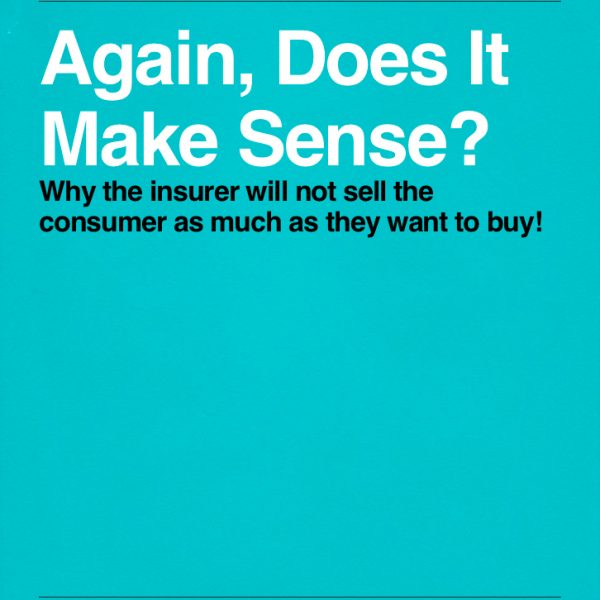This year I have traveled for business to a few countries — South Africa, India, Malaysia, Singapore, Thailand, Hong Kong, Taiwan, China, Germany, Tobago and the United Kingdom. Many an underwriter would say just a few months ago that I was rateable for some of that travel. Today I finally escape the dreaded rated or decline category. What has changed? Is the world a safer place? Have I avoided the mythical “hot spots”? Do I travel with protection (two legged kind that carry a weapon and not the one in a hermetically sealed envelop)? Was the whole travel issue, so bewildering to advisor and underwriter, some cockamamie, self inflicted punishment for nothing?
Nothing. No. No. No. Yes. The answers to the above mini quiz.
Years ago the industry had a standard travel question buried amongst many questions we ask the applicant for life or living benefit insurance. The question was close in words or implication to the following: “Do you plan on traveling outside of Canada or USA?” The rare modern types in legal preferred “North America” to “Canada or USA” but many countered that we then would accept Mexico as a legitimate destination free of extra risk. It was probably a function of which legal counsel had experienced Montezuma’s revenge. There was also the broader question “Have you or do you plan to travel outside of Canada or USA?”
For my first three decades in the life insurance business neither choice of question presented itself as an issue. That does not mean there was an absence of arguments over travel since occasionally the insurer and the reinsurer were asked to quote on unusual travel. As a reinsurer you would experience maybe two to five such travel issues in a year. Rarely did the issue of the moment escalate into a frustrated diatribe of a long-lasting feud.
In those long forgotten days we had three main categories of travel concerns:
- The “missionary” going to some far off land the underwriter could not spell or find on a map. The broker/agent was always just as cognizant of country facts as they always said the country or city therein was safe, clean and completely modern in all its facilities. Everything the underwriter read led them to believe running water was the river or the local well, sanitation was a trench you dug upon arrival and friendly environs meant no one had been lost that year. We risk takers really did not like odds of the person having normal mortality or morbidity, being able to investigate a claim or in some instances retrieving a body. The easy answer and most common was to just say no and no meant no. Amounts were small, premium trivial and commissions measly thus no real confrontation between agent/broker and underwriter.
- The “cheap travel insurance” purchaser always came in with the note attached from broker/agent that read “Proposed insured leaving in three days for Bogata and company mine site in the Andes so please rush standard decision.” Underwriters preferred to just postpone these cases until the return (if they returned) since the anecdotal experience was most lapsed upon return since it was indeed cheap travel coverage. Agent/broker always argued that the three days before trip was not a factor as they had been working for months trying to make the sale. I do not recall any of these escalating to upper management where the plea would be the risk selector’s decision was unfair or stupid. Amounts were middle of the road, premium reasonable and commission after charge back for lapse would be small but if no factoring of lapse into it the commission would be large. Confrontation minimal and short lived.
- The rare person of substance (wealth not girth although often they go together) who was going home, being transferred or was to be temporarily stationed abroad for a variety of legal reasons of which Canadian taxation played no role. These were always the difficult cases to ascertain how to best charge a premium tht reflected the additional risk if any existed. Rough residency tables, often years out of date, were referred to for guidance. The agent/broker was probably just as ignorant as the underwriter as to the real additional risk so in the end there was little debate over the underwriter’s decision. The underwriter was always worried about the same things — Could I validate the claim? Was there truly extra mortality? Would the premiums be paid? Amounts were larger than normal. Premiums generally high as proposed insured “loaded up” on cheap insurance. Commission great because of the latter two statements. Confrontation large but short lived.
To say underwriter and advisor lived in blissful peace would be an exaggeration. It was, by my recollection, three decades of rare and short lived skirmishes over who are travelling where and why and the ensuing trauma of finding out that certain global locations presented an extra risk be it medical, occupational or criminal. Were there facts to back up all the decisions? No. Did we make money on foreign travel and residency? I honestly do not know as I have never seen any meaningful insurance statistics (remember an insured population mortality is different than that of the general population). The numbers that any one insurer or reinsurer would amass were so trivial it would be near impossible to develop any meaningful statistical data. Anecdotes too were in scarce supply although every underwriter could relate a story of the unexplained death of an insured in a far off land where the body was quickly buried, burned or otherwise disposed of. Where there were more witnesses to the death than normally seen and the claims cheque was to be sent to the twin brother or sister we knew nothing about.
Then it all changed almost without any one event triggering the minute focus on travel. Yes the war on terrorism moved front and centre. Yes the incidents of foreign discontent seemed to grow. Yes certain countries became synonymous with extra risk, real or perceived. Yes reinsurers tightened up as they too faced tighter rules from their retrocessionaires. But in the end it was a fear of the unknown that led risk takers to take a broader and far more cautious approach to foreign travel and/or residency. Premium rates are 80% cheaper than three decades ago (if you are the super healthy non-smoking applicant). Margins are long gone in both the mortality component and expense component of the products. The target is a much smaller one and the tools to hit the target are much reduced. Compounding that is the fact that on preferred business the advisor may not even know the final price until the underwriting process is complete.
It has to be stated right from the outset that the following comments about why people are rated/declined or additional information is sought because of foreign travel has no relation to:
- ratio of consonants to vowels in name.
- race, creed or colour
- ethnicity of advisor
- where parents were born
- where underwriter was born
- reinsurance quota system
- location of insurer’s home office
I have heard or read an amazing array of reasons why advisors think they were “picked on” and their proposed insured singled out for special attention and scrutiny. Most of it was pure unadulterated balderdash generally stemming from the advisors own ignorance of what the real risk was and their own lack of understanding the true risk. At the very same time the insurer and reinsurer was trying to be extra cautious while they tried to create the right answer. The industry has always taken a safe route until it finds the most prudent solution which may indeed in many cases be a relaxation of stringent temporary measures. It is why smart insurers have not gone out of business and careless ones have opted to sell while the selling is possible. On the medical impairment side we forget that 30 years ago we rated all myocardial infarctions, 12 months post episode, at +200% and $35.00 per thousand extra whereas today the rating can be +150% in best case scenarios (the rare ones).
We were too cautious on reflection but only on reflection. As we dug into what is the right thing to do there was little or no cooperation between sales and risk selection. I heard of no advisor or advisor’s group stepping forward to work with underwriters to find the equitable solution so that those truly presenting an extra risk (similar to the obese coronary artery patient/applicant) would be charged accordingly. Underwriters or pricing actuarial types never approached the major advisor associations to find a common ground of constructive risk selection. We just screamed at each other and looked absolutely reactive and unprofessional.
What seemed like three years of mass hysteria ended with little notoriety and almost as limp as a wet noodle. As 2005 ended the industry found itself accepting a new question which read along the lines of the following: “In the upcoming 24 months, do you intend to travel for holiday or vacation to a location outside of Canada or United States for more than 2 months or 8 weeks whichever is less?” If yes the details were added. If no the truck driver taking a holiday in Iraq is home free if I understand the question correctly. The variations on the question were significant but not earth shattering. The eight weeks may have been reduced to four weeks in two years. Canada and USA may have been extended to Europe Union. If anything the variables made the question broader in terms of who could now answer no. Gone in a flash were holidays or business trips to China, Israel, Indonesia, etc. Gone was any need to furnish where in Israel or Indonesia you would be staying or visiting. Gone was the need to know which the good countries are and which the bad are. Generally speaking the industry was saying that if the travel was of short term nature for vacation, and in some questions business, you are a standard risk and need tell us no details.
What a remarkable turn around as most scrambled to get with the new definition of worrisome travel or really the reverse; what was bad travel. I am still in awe of how generous the new question is and wonder how rare it will be to see a positive answer and wonder what the details will look like. Will I ever see a positive answer?
Was it all a “tempest in a tea pot?” Perhaps but the industry needed to look at facts and fiction and then judge what is the right answer to be equitable to all applicants and at the same time prudent for owners.
I am still close to a decline or a decline depending on the mood of the underwriter and company I try and buy from the day before getting on a plane. I cannot answer truthfully that my travels will be less than twenty weeks let alone four. I am also a klutz and seem to attract war, insurrection, epidemics and poor restaurant staff hygiene. That reminds me to refill my extra strength Imodium container.

